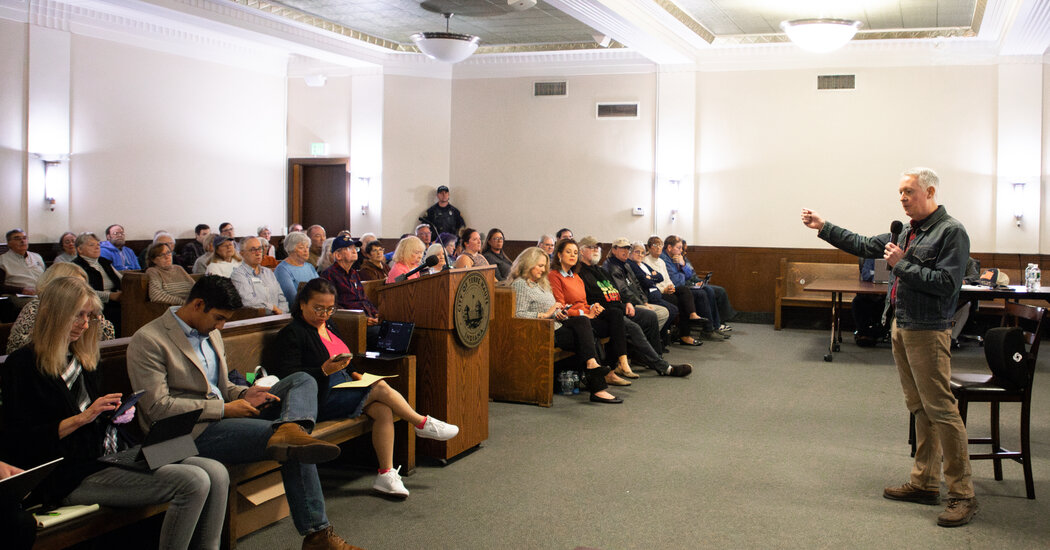For two hours on Saturday, Greg Goode, a Republican member of the Indiana Senate, sat on a tall wooden chair, listening as constituents told him they oppose a plan to redraw the state’s political map to send more Republicans to Congress.
No one spoke in favor of the idea. Mr. Goode said later that six of the roughly 200 people who showed up for the event, which he arranged, indicated support for the redistricting plan on a sign-up sheet.
As Republicans and Democrats across the country race to draw new maps outside the usual once-a-decade cycle, often with little intraparty debate or discussion with opponents, Saturday’s exchange stood out as a counterpoint. Here was a Republican lawmaker saying he was unsure how he would vote on a map sought by President Trump, and seeking feedback from a left-leaning crowd that spoke against drawing new maps and described broader fears about the country’s direction.
“A fascist government has decided that they’re going to tell all the way down to the smallest district who’s boss,” said Thomas Baer, 68, a Terre Haute resident who urged Mr. Goode to “say no to this blatant power grab.”
Several states have moved quickly to draw new maps, with only nominal resistance from members of the party in power. But passage of a new map advantageous to Republicans is not a certainty in Indiana, where the president and his allies have struggled for months to muster enough support. Legislators like Mr. Goode will decide what happens.
More than 60 people, some of whom waited in the November chill to be let inside, spoke to Mr. Goode on Saturday in Terre Haute’s dimly lit City Council chambers. The senator, who was seated about 10 feet away, nodded and thanked them for coming. The conversation remained calm, respectful and even earnest at times.
“Changing the rules in the middle of the game is not what Hoosiers do,” a man told Mr. Goode. “It’s about ethics, representation and democracy itself,” one woman said. Another woman said that “this is nothing more than stealing,” and asked whether the senator’s listening session was “just for show today, or is this for substance?”
Redistricting typically happens at the beginning of each decade, based on new census data. But ever since Texas Republicans, acting at Mr. Trump’s behest, passed a new congressional map this summer that positioned them to flip five Democratic-held seats in next year’s midterm elections, leaders of both parties have scrambled to wring out more seats in states where they control the legislature.
On the Republican side, Missouri and North Carolina have passed new maps. On the Democratic side, Virginia and California have taken steps toward creating new boundaries, with California voters set to decide Tuesday on a proposal that would position Democrats to flip five seats next year.
More states could follow.
In Indiana, which Mr. Trump carried by 19 percentage points last year, Republicans now hold seven of the nine congressional seats and the party has large majorities in the state legislature. But some Republican state lawmakers have publicly balked at redrawing the lines to create a congressional map that would favor Republicans 8-1 or 9-0.
The debate grew more urgent last week when Gov. Mike Braun, a Republican, called a special legislative session to consider a new map. Within minutes of that announcement, a spokeswoman for a top Republican in the State Senate said “the votes still aren’t there for redistricting,” leaving open the possibility that lawmakers could return to the Capitol but fail to pass a new map. That special session was scheduled to start on Monday, but lawmakers have indicated that they are likely to wait.
Many Indiana Republicans, including members of the U.S. House delegation, have fallen in line behind redistricting, especially as more Democratic-led states have joined the push. When he called the special session, Mr. Braun framed it as a way to “protect Hoosiers from efforts in other states that seek to diminish their voice in Washington.”
An exact vote breakdown in the Indiana Senate remains unclear, but Mr. Goode’s eventual decision could be critical.
On Saturday, Mr. Goode said he had not yet seen a proposed map and that he did not plan to take a public stance on redistricting until it was time for him to vote. He said it had been “overwhelming that folks here, so far, are not for it,” and that he would continue to seek input.
“We’re still less than a week from when the governor called the special session,” Mr. Goode told reporters. “That’s why you take everything and you process it, but you’ve got to keep listening.”
Mr. Goode has criticized some of the discourse around remapping. Last month, he posted on Facebook about “those trying to bully me on redistricting.” He included a photo of Robert F. Kennedy, the Democratic senator who was assassinated in the 1960s, with his post, writing, “I pray to our Lord and Savior for wisdom and reflect on political heroes who stood up for the greater good above the politics of the day.”
On Saturday morning, Mr. Goode placed a copy of Norman Rockwell’s “Freedom of Speech” painting on the sign-in table and thanked the mayor of Terre Haute, a Democrat, for opening City Hall for the event on short notice. Mr. Goode talked about Mr. Kennedy and the Rev. Dr. Martin Luther King Jr. in his opening remarks.
“I’m a big believer in looking to the past, and challenging times our country has faced, and kind of trying to rise to the occasion,” Mr. Goode told the crowd.
The president and his allies have lobbied aggressively for Indiana to pass new boundaries as part of the effort to maintain or expand Republicans’ narrow House majority. Mr. Goode said he was part of a group that met with Vice President JD Vance in Indianapolis, and that he had also visited Washington and been on a conference call with Mr. Trump. Mr. Goode said he was “very grateful for the case that they made.” He said he did not feel that the White House had pressured him.
Mr. Goode, who joined the Indiana Senate in 2023 after local Republican Party members selected him to fill a vacant seat, represents an area about 75 miles southwest of Indianapolis that used to be more politically mixed but is now solidly conservative. The largest city in the district, Terre Haute, population 58,000, is home to Indiana State University and a federal prison.
Republican state legislators in Indiana have been inundated by emails from conservative groups, and some activists have threatened to mount primary challenges against lawmakers who do not fall in line. Mr. Goode is up for election next year. The Democrats fielded no candidate in his district in the last cycle.
Vigo County, where Terre Haute is situated, was long seen as a bellwether in presidential elections, having voted for every winner from 1956 through 2016. It has since become solidly Republican, voting for Mr. Trump by 18 percentage points last year.
In interviews, residents said they believed that their state was more politically diverse than the numbers suggested. Several expressed optimism that showing up to share their views with Mr. Goode on Saturday might have an effect.
“Participation is important,” said William Carper, 76, who describes himself as a political independent and said he opposes drawing a new map. “If you don’t speak,” he added, “people will not hear your voice.”
As the event on Saturday wrapped up, Mr. Goode said he was “going to continue to keep this open mind” and encouraged residents to stay in touch with him. Later that day, he said in a text message that he was “grateful that so many took time to respectfully voice their opinions.”
“I was moved,” he added.
Mitch Smith is a Chicago-based national correspondent for The Times, covering the Midwest and Great Plains.
The post Indiana Republican Tries Different Approach in Debate on Voting Maps: Listening appeared first on New York Times.




